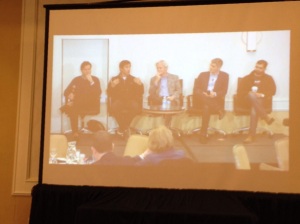
S. Tien Wong brings members of the entrepreneurial community together each quarter through Big Idea CONNECTpreneur events.
At Big Idea CONNECTpreneur’s Winter Forum, organizer Tien Wong’s positive energy filled the room. For about three years, the successful Virginia-based global tech company CEO of Tech 2000 and Appnetic, Chairman of Lore Systems, and investor, has gathered 250 or so CXOs, business leaders and investors each quarter for a half-day program at the Tyson’s Corner Marriott. Tien organized the event and describes it as “a celebration of entrepreneurship and a great way to see a lot of people all at once.”
Mixing the suit-clad community with tech-enabled startup CEOs given a pitch platform is good for business. It was refreshing to be in a friendly room without a VIP section.
Marissa Levin, CEO, Successful Culture and Washington Business Report contributor, makes it a priority to attend. She’s proud to call Tien one of her closest friends and most important mentors.
“There are a few people in our region that are shaking things up and doing things differently; Tien is definitely one of those people,” says Marissa. “Tien does an extremely good job of getting a room full of people who think differently and people who have ideas to pitch.”
Here’s 2U Chip Paucek

2U CEO, Chip Paucek, stands out in his suit thanks to the brightly colored Pashmina scarves he favors.
Tien interviewed featured guest, Chip Paucek, CEO and co-founder of 2U (NASDAQ: TwoU), the next generation of advanced online degree programs in collaboration with top-flight universities. The six-year-old company, which went public early in 2014, has raised $102 million in venture capital to support the investment component of its business model. The discussion with Chip was a good counterpart to the panel of traditional and nontraditional VCs on the current state of venture investing that followed.
Good Team Members Stick Together
“The third time’s the charm” said Chip, alluding to his first two familiar but financially unsuccessful ventures, Hooked-On Phonics and Cerebellum, a TV show that, thanks to greater access to the Internet, grew into a profitable series of middle school and high school courses taught by comedians.
In 2008, Chip and his co-founders were captivated by the idea of “desegregating” students pursing advanced degrees online so they could have the same faculty, rights, responsibilities, degrees, and ultimately, alumni network of students physically in attendance at many of the nation’s top universities. Somehow, Chip convinced two deans at USC to offer advanced degrees online, first in education, then social work and nursing. He had no data, no university-level track record, oh, and asked for half of the revenue please. Today, 2U’s over 800 employees include many previous team members.
“We got lucky,” Chip said in a later conversation. “With more experience, I’m very happy to have had enough lumps to appreciate the wins — and that was a win. We did right by it, though. They were pretty tough disciplines to do online so we focused on the quality.” Enter Georgetown’s Jeff Reid, Founding Director Georgetown Entrepreneurship Initiative, who opened doors, followed by others, including UNC Chapel Hill’s MBA program in which Chip is currently enrolled in an online program 2U made possible. The concept is not to create 2U programs, but to expand university programs with an online option for students who must meet the same acceptance criteria as those on campus.
Focus on the business model
2U has spent over 6 years focused on its business model, which now serves about 10,000 students. The idea is to add 500-1,000 new students to a program without diluting the brand or student experience. The company is super selective a bout candidate programs because this is a two-way investment:
“2U invests between $5 and $10 million of negative cash in the first three years of a degree relationship and contracts are no shorter than 10 years,” Chip explains, “so it has to fit the investment thesis.”
Not only must the market opportunity be right for a particular degree offering, more importantly, it takes the right university leadership team to launch the program.
“We raised $102 million in Venture Capital, a massive commitment of faith from VCs,” says Chip who notes “funding to fund as well is pretty complicated. So, we became obsessed with putting more data behind the selection process.”
2U build an algorithm to help predict enrollment for any school in the country that it takes online.
“Without USC and Georgetown, U2 wouldn’t exist,” says Chip. “While technology does power the whole thing, it’s really about the will of a great institution.” Chip credits Georgetown’s Jeff Reid for having the vision to help him approach the administration and appropriate departments there.
Stay focused, but flexible
“I take credit for keeping us focused and learning from failure,” he says. “If you’re not focusing on that business model it’s easy to innovate yourself to death by continuing to drive some new product opportunity that really requires an entirely different set of business model principals.” The 2U business model is based on five pillars: course content from top schools; class size < 11 students per class; student inclusion into the university’s established networks; supplementary real-world experiences; and white glove support for students and faculty within their own time zones.
“We’re going to build the world’s best online advanced degree programs,” says Chip. “That’s what we do. We’re going to work with great colleges to do it and it’s working incredibly well. It’s pretty rare to find this kind of organic growth potential to put capital to work. I happen to believe that 2U is a rare company whose first act can be a billion in revenue. I think that’s unusual and we’re not going to let it go. The challenge is you’ve got to find that business model first. Online programs existed long before 2U, what I think we’ve done is made them intimate, made them real, and made you a real member of the community in a way that you typically don’t see with online programs. And, I’m very proud of that and excited about what it means for the future.”
The Investor Panel’s Perspective

Big Idea CONNECTpreneur “All-Star Investor” panel from left to right: Moderator, Jonathan Aberman, Bobby Ocampo, Jason Shrensky, Jake Tarr, and Paul Singh
Startup community leader and mentor, Jonathan Aberman, founder and managing director, Amplifier Ventures and Tandem NSI, moderated the experienced investor panel, providing a glimpse of the current state of investing. I caught up with Jonathan by phone after the event to discuss what I’d heard. Jonathan has hard-won insight from his investment experience and shares it readily as co-host of “Left Jab,” a live radio show with Mark Walsh on Sirius Radio. He’s a straight-shooting, ex-Wall Street Lawyer raised in Philly and only somewhat mellowed by living in Virginia. He is candid about the challenges facing venture capital:
“The VC industry is clearly going through a period of transition,” Jonathan says, “and there are very different opinions about how much it’s going to change. From my viewpoint, the biggest issue with the venture industry now is the venture industry stopped being a venture industry in a lot of ways. It’s just become another alternative investment asset. Investors really don’t care whether it’s a hedge fund, venture fund, or a private equity fund, they care about ‘how much is my return and how much risk am I taking?’ The problem is that venture capital as an asset class finds it really hard to compete with hedge funds. With hedge funds you get your money out every quarter. With a VC fund, if you’re doing an early stage investment, it is 10-12 years before you know whether or not it’s a good investment. So, the industry has moved away from that to high-velocity momentum investment, which is why they’ll throw money at UBER or SurveyMonkey. The industry is changing into one that makes big investments to try to get money in 18 months to 3 years. And, then, it’s left this huge void. Jonathan concludes: Ultimately, I think the real challenge for our economy is that these $100 million funds go away and all you have left is momentum investors.”
Where you stand is where you sit
Jonathan points to the varying viewpoints on the panel. On the one side you’ve got two really smart, good VCs in the traditional hands-on-model, Bobby Ocampo, Director, Revolution Ventures, and 27-year industry veteran Jake Tarr, Managing Director, Kinetic Ventures. On the other hand, you’ve got smart, new model VC, Paul Singh, Founder & CEO Disruption Corp. and general partner of Crystal Tech Fund, Disruption’s post-seed venture capital arm, and straight-up Angel investor, Jason Shrensky, who among many projects was co-founder of co-working office space UberOffices.
For the new-model VC, a growing funding gap enabling companies to scale is filled by crowdfunding, angel funds, and other nontraditional investment. Focused execution and speed rule.
I was behind the scenes of many VC/startup stories since writing for PwC’s Nextwave (featuring the MoneyTree VC investment survey) during the wild, heart-breaking ride of 1999-2004, so the traditional investor approach that most startups fail and traditional VCs rely on one or two big wins to return the fund is familiar standard wisdom.
It was interesting to hear what the VCs were up to and, as always, there was a bit of personal style on display. Frankly, it’s not the first time I’ve heard Paul Singh say: “Now, this is public information, but still…don’t Tweet this…”
See a sampling of panelist quotes here: http://www.bizjournals.com/washington/blog/2014/12/the-investing-biz-is-changing-faster-than-you.html?ana+twt&page=all
Jonathan concludes: “The reality is nobody knows what’s going to happen. There are times in life where the trend is clearer and where you can extrapolate, and this is one of the moments when you can’t.” As for his latest project, Tandem NSI, funded by the Commonwealth of Virginia, will work to accelerate economic development and national security entrepreneurship by attracting government investment in the Greater Washington Region.
Keep Connecting
“One of the things that CONNECTpreneur has done an exceptional job of is helping to get people to lift up their eyes and say there’s more going on in this region than government contracting,” says Marissa.
Tien says simply: “We just put on an event I would absolutely hate to miss.”
I’m glad I went.
